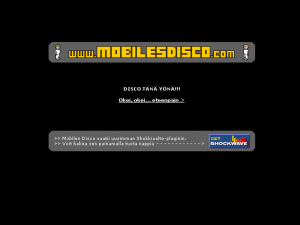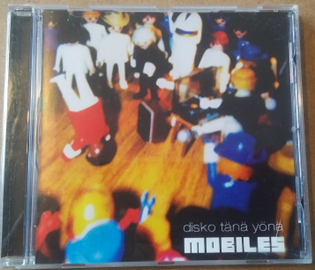Mobiles Disco

Mobiles Disco (or MobilesDisco.com) is the progenitor of Habbo and was created in August 1999. It was developed by Aapo Kyrölä and Sampo Karjalainen, the creators of Habbo as a project in their free-time when asked to create a site for Mobiles, a Finnish rap band. They decided to create a virtual retro gaming style virtual environment. They went on to develop Lumisota afterwards.

History
Mobiles Disco was designed for fans of the band to visit a space online collectively to chat and engage with each other. The game had no purpose other than a simple two-room layout of a bar and disco room for users to create avatars to socialise and dance. During the sign-up process, users would create an avatar, much like in Habbo. The game ran on Aapo's FUSE technology, which was a Java-based server made for easier communication between Director Shockwave-movies and the server using the fuse-protocol. Sulake built this client-server system to use on Mobiles Disco because the designers weren’t impressed with Macromedia’s own multi-user server. It enabled developers to run different rooms on Habbo Hotel on different servers and add new hardware when needed. Sulake also provided an open-source version, FUSE Light on its website for other designers to use.
The game grew increasingly popular and had many of the rooms filled with foreign users, which made it known as a hangout for a generation of web designers seduced by the distinctive visuals. This lead to the opening of an international version. After the success of Mobiles Disco and Lumisota, Aapo and Sampo sought out to create Hotelli Kultakala (Habbo Hotel Finland). This lead to the closure of the game in the year 2000.
When interviewed for a book on 3D web applications in 2002, Sampo stated:
"We weren’t really trying to build and online community in the first place, the idea was just to make something interesting for the band. But the site started to live its own life. It worked so well, we wanted to continue working on the same kind of projects"
Design
The visual influences for Mobiles Disco were Playmobil toys and old computer games, like Head over Heels on the old 80s gaming console the ZX Spectrum. On it’s 3D perspective, Sampo commented:

"spatiality is an important factor in Habbo and Mobiles Disco, it makes a place feel like a real social environment. Sitting around a table discussing, seeing other people in the room but not hearing them … it’s like a real world café or bar."
Sampo also considered useability to be a key feature in the hotels design:
"The main issue is accessibility. It must be easy for the user to get started. Once you learn to use the interface and get some friends, it makes sense to gid deeper – get your own room, furnish it and arrange different kinds of activities. It’s like climbing steps: you can’t ask the user to start a virtual life on the front page. Most users just want to check it out and have fun."
Sampo believed accessibility had to be as seamless as possible, yet the Macromedia Shockwave plug-in, not being as widespread as Flash player at the time, meant some users couldn’t access it immediately, he noted that an in-browser experience was:
"...better than proprietary client software, which needs to be downloaded, installed and maybe even configured before you can enter the environment".
Later, Sulake sought to work on projects within Habbo where users could have even more control over the environment, building their own rooms and authoring their own content.[1]
Habbo
As part of Habbo's history, two rooms were created as Public Rooms titled Old Skool Habbo inside the hotel as a token of nostalgia, during the April Fools weekend in 2016. This was much like Snow Storm being re-invented and implemented into the hotel based on Lumisota.
There has been no news since of a revival of the popular rooms.
Gallery
-
Logo of FUSE
Trivia
- Sulake also later built HUUHAA, a client-server technology for massively multiplayer online role-playing games (MMORPGs), which would’ve used a similar 3D perspective to Habbo but allowed for endless scrolling edges for open world exploration. A medieval themed game named Urjala was developed for this paltform.
- ‘Huuhaa’ means rumour or falsity in Finnish and a Habbo of that name (or variant) was among the first 25 Habbo’s on international Habbo Hotels including Japan, Spain and USA.
References
- ↑ S. Dredge, Web 3D, London, Laurence King, 2002, P22-27 ISBN: 1 85669 283 3







